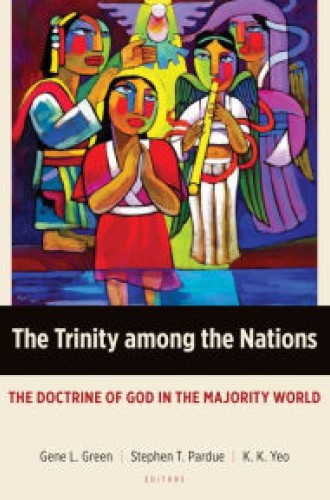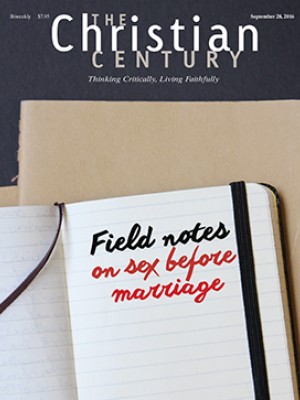Three in one around the world
What's more important: calculating the logic of the Trinity, or doing theology across cultures?
"Theology,” according to K. K. Yeo, “is to speak well of God, with clarity, eloquence, and power.” Who is speaking, however, and in what language? The conversation, at least in the published literature, has been dominated by theologians from Europe and North America despite the fact that more Christians now live in Africa, Asia, and Latin America. This book offers a needed corrective. The authors of its essays are committed to doing theology in creative dialogue with Christian traditions of the Western church and scholars from the majority world.
This volume, the second in Eerdmans’s Majority World Theology series, focuses on the doctrine of the Trinity. The authors all agree that this doctrine has important practical implications for how and why Christians ought to worship, proclaim the good news, and seek social justice. Simply put, the proper aim of theology is doxology. The intellectual challenge, however, is to understand and make sense of the claim that God is triune. How can we say more about the triune God without contradicting the scriptures and without falling into the error of tritheism (which posits the existence of three equal but distinct gods) or the error of modalism (which implies that the Father, Son, and Holy Spirit are not distinct persons but mere modes or aspects of the one God)?
Read our latest issue or browse back issues.
Gerald Bray, a British theologian who writes from an Anglican perspective, argues that the core of traditional teachings about the Trinity, which developed against “the backdrop of Greek philosophy and Roman law,” should not be lost or diminished in the current theological conversation between scholars in the Western church and in the majority world. This teaching has been preserved in the Nicene and Chalcedonian creeds (325 CE and 451 CE). In God there are three distinct persons in one substance. Each person in the Trinity—Father, Son, and Holy Spirit—is distinct from but shares the same being as (or is “consubstantial” with) the other persons. Samuel Waje Kunhiyop, writing from an African historical and cultural Christian perspective, agrees with Bray. He argues that these creeds “should be the universal teaching of the Christian church” and are correctly “considered orthodox (right doctrine) not only for past generations of believers but even for today.”
However, Randy S. Woodley, writing from a Native American Christian perspective, disagrees. He writes, “I think neither Jesus nor the early church ever imagined a religion where orthodoxy was enforced by anyone.” The Nicene Creed, for example, which is used by many Christians as a standard of orthodoxy, was “influenced by the utopian legacies of the Greeks” and “Roman imperialism.” Woodley declares that Jesus would have condemned the offspring of such a marriage. Instead of remaining preoccupied with theorizing about God’s being (or with “divine ontology”), which is beyond human comprehension anyway, Woodley suggests that theologians admit the Trinity will remain a mystery. The best they can do is point to images that shed some light on the doctrine of the Trinity, such as the image of a community in harmony (or in what Woodley calls “shalom relationality”).
Antonio González, writing from a Latin American Christian perspective, focuses on the early development of Christology. How did the early Christians both affirm the divinity of Jesus and remain committed monotheists? González argues that the answer can be understood only against the background of the Hebrew scriptures, which claim that the rule of God is completely exclusive. If God rules as king without intermediary figures, and if through his life, death, and resurrection Jesus has become the one true king, then Jesus is “included” in the divinity of God. Moreover, the exclusive rule of God has, according to González, radical practical implications for our political systems: patriarchalism has no place, there should be an end to extreme social (e.g., economic) differences, and Jesus’ followers will not have an army.
Some questions naturally arise from the authors’ arguments. First, is it legitimate to insist on the necessity and/or finality of the creeds in a conversation aimed at including neglected Christian voices from the majority world? One who does so insist seems to be saying something like, “All are welcome to discuss the Trinity, so long as we end up agreeing on the belief in the hypostatic union.” Second, even if the Trinity is in some sense a mystery, why insist that theorizing about it in propositional (rather than narrative) form is always useless or undesirable? Perhaps such theorizing can aid in responding to arguments that the doctrine of the Trinity is incoherent, for example. Third, González’s argument from the exclusive rule of God to the practical conclusion that Jesus’ followers should not have a military is too quick. Did Jesus intend his commands to turn the other cheek and love the enemy (Matt. 5:38–48) to shape the foreign policies of modern nations? Moreover, how is the claim that God rules without intermediary figures to be reconciled with biblical passages like 1 Timothy 2:5, which states “there is one God; there is also one mediator between God and humankind, Christ Jesus, himself human”?
This book will not satisfy those who seek technical debates about the logical consistency of the doctrine of the Trinity or the so-called “threeness/oneness problem.” In fact, some of the essays in this volume contain little or no discussion of the doctrine of the Trinity. They do, however, contain valuable discussion about the prophetic role of the church, the role of Christians in the academy, the motherliness of God, and the difficulties of translating the names of the Christian God into other languages. Perhaps most strikingly, they demonstrate how scholars from different cultural-linguistic contexts can do theology together.






